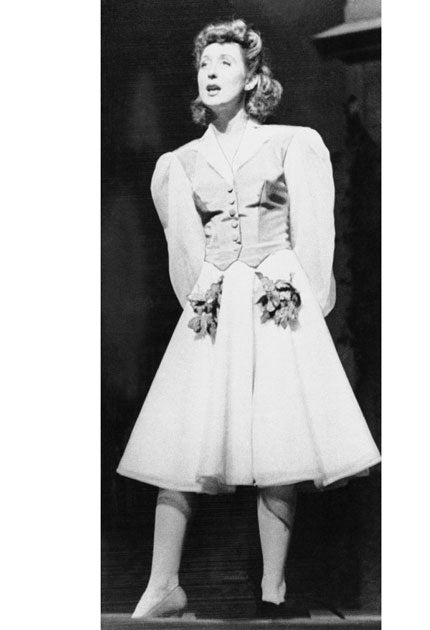Betty Garrett: Actress and singer best known for 'On The Town' who re-established herself after being blacklisted

Like many figures in Hollywood and on Broadway, Betty Garrett's rise to fame was interrupted by the House un-American Activities Committee. But she came back to forge a successful stage and television career as a singer, dancer and actress.
Garrett's childhood was unsettled: shortly after she was born the family moved to Seattle, where her mother sold sheet music, but her alcoholic father died when she was two. After living in a series of low-rent residential hotels her mother married an old flame and the new family moved to Regina, Saskatchewan. But he soon started a gay affair and mother and daughter returned to Seattle.
Though her school had no drama department, Garrett began to organise plays. Martha Graham, on tour in the city, recommended her for a scholarship at the Neighborhood Playhouse in New York, where her teachers would include Graham herself, Sandy Meisner and Margaret Webster.
Mother and daughter arrived in the city in 1936. She was soon working in all genres: comedy with Danny Kaye and Jerome Robbins; understudying in Orson Welles' last Mercury Theatre production, Danton's Death, dancing with Graham's company and performing in satirical revues. She briefly joined the Communist Party and took part in fund-raisers.
When the US entered the war, Broadway responded with a series of morale-boosting comedies and, starting in 1942, Garrett appeared in the multi-authored Of V We Sing and Harold Rome's Let Freedom Sing. When Ethel Merman, star of Cole Porter's Something for the Boys, fell ill, Garrett took over for a week and she later recorded the comic song "By the Mississinewah". After playing Sgt Maguire in Vernon Duke's Jackpot, Garrett began touring her nightclub act.
Around this time she met Larry Parks, and they married; Lloyd Bridges was best man and they became godparents of his son, Jeff. However, their careers kept them apart: Parks' starring role in The Jolson Story (1946) led to British tours; meanwhile, as the War ended Garrett appeared in the revue Laffing Room Only before rejoining Harold Rome and choreographer Busby Berkeley to star in Call Me Mister (1946) in which she bemoaned the fact that the War had taken all the men away in "Little Surplus Me".
The acclaim led to a contract with MGM. After Big City (1947) came Words and Music (1948), Richard Rogers' sanitised posthumous biography of his songwriting partner, Lorenz Hart (Mickey Rooney). Garrett's character rejects Hart because he is too short (though his bachelorhood was actually down to being gay).
Garrett's cinematic highpoint came in 1949. She played a love-struck fan of Frank Sinatra in Take Me Out to the Ball Game (released in the UK under the more British-friendly title Everybody's Cheering), while in Neptune's Daughter she sang "Baby It's Cold Outside" opposite Red Skelton. But her biggest success was in On the Town as the brassy taxi driver Brunhilde Esterhazy rebuffing Sinatra's lists of New York sights to visit with a voraciously cannonading "Come Up to My Place".
In 1951 Parks was called before the House un-American Activities Committee, though the heavily pregnant Garrett escaped the call. Both their careers were hit: her insistence on being called Mrs Larry Parks caused problems, and thereafter much of her career was on stage and occasionally on TV. The blacklist meant they were able to spend more time working together in lower profile productions.
In 1955 she returned to film, playing Ruth to Janet Leigh in the musical My Sister Eileen, while 1956 saw her on Broadway for The Bells are Ringing, though her most successful show was 1963's Spoon River Anthology, a series of dramatic readings of Edgar Lee Masters' verse. In 1973 she began playing an Irish-American neighbour in 24 episodes of All in the Family, the US version of Till Death Us Do Part. The following year she added the much-divorced landlady in the Happy Days spin-off Laverne and Shirley, clocking up 96 appearances and marrying Laverne's father. In 1981 she left for a Broadway production of The Supporting Cast but it only lasted eight performances; she couldn't return to Laverne and Shirley as she had already been written out. Later TV guest appearances included The Golden Girls and Grey's Anatomy, and she directed a staging of Arthur Miller's The Price.
Other Broadway appearances included Meet Me in St Louis (1989-90), and 60 years after her debut the 2001 revival of Sondheim's old-troopers' musical Follies; her understated rendition of "Broadway Babe" was a highlight. She then mounted a one-woman show based on her autobiography, Betty Garrett and Other Songs, and returned to the cinema in two lampoons, Trail of the Screaming Forehead (2007) and Dark and Stormy Night (2009).
In 1960 she had helped found the non-profit Theatre West drama school and was still teaching musical comedy there a few days before she died.
Betty Garrett, actress and singer: born St Joseph, Missouri 23 May 1919; married Larry Parks (died 1975; two sons); died Los Angeles 12 February 2011.
Join our commenting forum
Join thought-provoking conversations, follow other Independent readers and see their replies
Comments